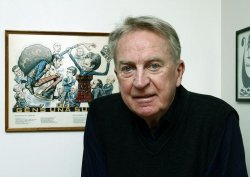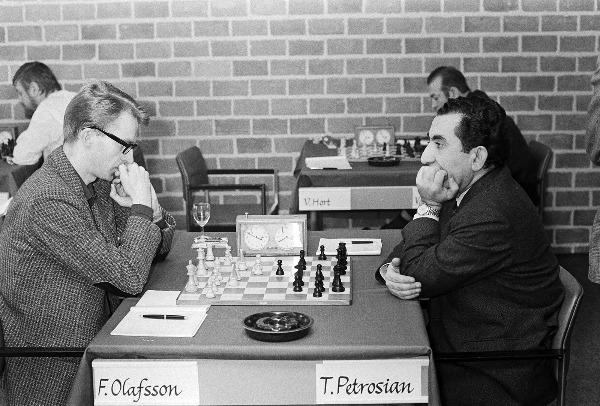
Fridrik Ólafsson’s Final Interview
16.04.2025 08:15 | InterviewsFridrik Ólafsson, Iceland’s first grandmaster, passed away on April 4, 2025, at the age of ninety. This article is not just an interview — it is a quiet testament to a time and to a man who helped shape the history of chess.
Born in Reykjavík in 1935, Ólafsson rose to prominence in the 1950s and 1960s and became one of the world’s top players. In 1958, he earned the title of international grandmaster — the first Icelander to do so. That same year, he tied for 5th–6th place at the zonal tournament in Portorož, which qualified him for the Interzonal in 1959, held across Bled, Zagreb, and Belgrade. There, however, he finished seventh out of eight and did not advance further in the World Championship cycle.
Despite this, he became a national hero and the catalyst of Iceland's chess boom, paving the way for Reykjavik to become a global chess capital — and eventually the host city for the historic 1972 World Championship match between Bobby Fischer and Boris Spassky.
In his final interview, Fridrik Ólafsson reflected on his life in and beyond chess — his friendships with legends, his presidency of FIDE, the arrival of computers, and the values that guided him through decades of change.
.png)
Fridrik Olafsson in 1961 in Beverwijk. Photo: Anefo/Dutch National Archives.
He first met Bobby Fischer at the 1958 Interzonal in Portorož. Fischer was only fifteen at the time — still very much a boy, Ólafsson recalls. But they quickly became friends. One day, between rounds, Fischer told him that he expected to become World Champion within two years. “Bobby, you’re in a bit of a hurry,” Ólafsson replied with a smile. They played a few more events together in the following years, but after Ólafsson completed his law studies and stepped away from professional chess, they drifted apart. By the late 1960s, Fischer had changed. “He started to believe in all sorts of theories — about the Soviet Union, the FBI... He wasn’t the same nice young Bobby anymore.”
When he was elected FIDE President in 1978, Ólafsson set out to improve the conditions for professional players. "At the time, there were hardly any standards. With a group of like-minded players, we decided to make a change — to bring in minimum requirements for tournaments so players could point to something and say: ‘This is not acceptable.’ We were the ones who had suffered from poor conditions, so we knew what needed fixing.”
In the same period, chess was starting to intersect with technology. Around 1979–1980, the first chess computers emerged. Ólafsson attended the inaugural World Computer Chess Championship in Austria and even played one of the machines in a public demonstration. “I beat the world champion computer in fifteen moves,” he said, chuckling. “They still had a long way to go — but the fact that companies were putting money into chess was a good thing.”
Ólafsson’s relationship with chess had always been deliberate. “Even as a child, I knew I had some talent, but I also realized I shouldn’t become too dependent on it. I was only about ten or eleven when I had that thought.” He studied law, graduated from university, and worked as a lawyer and later as Secretary General of the Icelandic Parliament. “I decided chess would never be the thing that controlled my life.”

Olafsson playing Petrosian in Wijk aan Zee in 1971. Photo: Rob Croes/Dutch National Archives.
During the tense moments of the Fischer–Spassky match in 1972, Ólafsson found himself in a delicate position. “I knew them both well. I had to be careful not to take sides, so I stayed in the background in case a problem came up and I could help solve it. I was in Fischer’s suite with Lombardy, trying to convince him to play the second game. In the end, Bobby said, ‘Okay, but you’ll have to turn back the clock.’ I called Lothar Schmid, the arbiter, and he said, ‘That’s not possible according to the rules.’ So that was that.”
Of all the opponents he faced, Fischer was the most difficult. “When Bobby made a move, you could feel it was the right one. You could sense the strength behind it — some called it animal energy. Spassky said that once. Maybe he was right.”
In Fischer’s final days, Ólafsson visited him regularly at the hospital. “It was very sad. I tried my best to persuade him to let the doctors help. I’m told it would have been a minor operation, but he was stubborn. One of the doctors said, ‘He fought his own battle.’”
And yet, Ólafsson adds, there was something noble about it. “He drew a bad hand, but in a way, he won. He never wavered, never strayed from the path he chose. Once Bobby made up his mind, there was no changing it.”
.jpg)
Olafsson with Praggnanandhaa Rameshbabu at the 2017 Reykjavik Open. Photo: Maria Emelianova/Reykjavik Open.
Fridrik Ólafsson’s legacy goes beyond titles and tournaments. He was the figure who brought chess into the heart of Icelandic culture — not only through his skill over the board, but through the quiet strength and dignity with which he lived his life. He played with elegance, led with purpose, and spoke with clarity. In the world of chess, his voice will be missed — but never forgotten.
